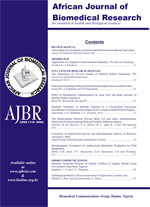
|
African Journal of Biomedical Research
Ibadan Biomedical Communications Group
ISSN: 1119-5096
Vol. 20, No. 3, 2017, pp. 261-265
|
 Bioline Code: md17039
Bioline Code: md17039
Full paper language: English
Document type: Research Article
Document available free of charge
|
|
|
African Journal of Biomedical Research, Vol. 20, No. 3, 2017, pp. 261-265
| en |
Prevalence of Adverse Reaction to Whole Blood Donation Among Voluntary Donors in Asaba, Nigeria
Eluke, B.C.; Okonji, C.U.; Ukaejiofo, E.; Eluke, C.C.; Uchendu, K.I. & Ibeagha, I.
Abstract
Fear of donation and adverse reaction to donation can lead to reduction in subsequent donations. The present study is designed to determine the incidence and the association of some predictive risk factors like age, sex, blood group, donation status, donors full blood count to adverse reaction during donation in Asaba Nigeria. Four hundred and fifty-nine (459) voluntary (non-remunerated) blood donors in Federal Medical Center, Asaba participated in the research from August 2015 to January 2016. The subjects consisted of 413 (90%) males and 46 (10%) females. Their blood samples were analyzed by standard techniques. All adverse reactions observed were classified and recorded. The overall incidence of adverse donor reaction was observed to be 2.18% for needle injuries and 2.83% for vasovagal reactions. Dizziness a (mild vasovagal reaction) and bruising/hematoma were the most frequent complications associated with blood donation. The frequency of adverse reactions was higher in younger donors and female donors. Blood group B had a higher predictive value (Odd Ratio 1.112 (0.810-1903) for the association of risk factors to adverse donation. More first-time donors 8(1.74%) compared to 3(0.66%) periodic donors experienced more adverse events. The mean values of electrolytes (Na+, Cl- and HC03-) post donation was significantly different (p < 0.05) from pre-donation values. The prevalence of adverse events to blood donation in Asaba is low for vasovagal and needle injuries. Blood donation is safe. However, this can be made even safer by counseling donors before donation to promote better donor turnout.
Keywords
Blood Donation; Adverse Reaction; Nigeria; Blood Group
|
| |
© Copyright 2017 - African Journal of Biomedical Research
|
|
